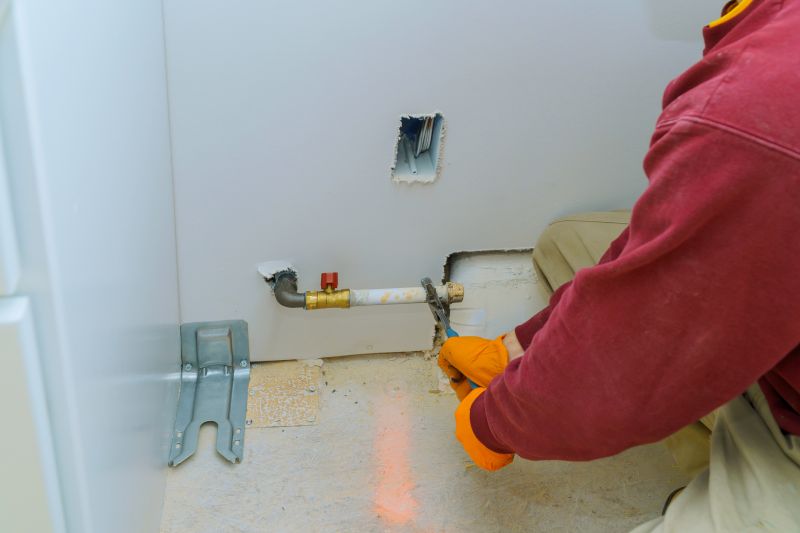Leading Tools and Supplies for Gas Line Service Professionals
Access a comprehensive range of trusted products that help ensure quality work and safety in gas line installation and repair.
 Gas line service involves a range of specialized tools and equipment designed to ensure safe installation, maintenance, and repair of gas piping systems. Proper handling and troubleshooting require reliable products that can accommodate various types of gas lines, including natural gas and propane. These tools are essential for professionals and DIY enthusiasts alike, aiming to prevent leaks, ensure proper pressure, and maintain the integrity of gas systems. The right products can make complex tasks more manageable, minimizing safety risks and improving efficiency.
Gas line service involves a range of specialized tools and equipment designed to ensure safe installation, maintenance, and repair of gas piping systems. Proper handling and troubleshooting require reliable products that can accommodate various types of gas lines, including natural gas and propane. These tools are essential for professionals and DIY enthusiasts alike, aiming to prevent leaks, ensure proper pressure, and maintain the integrity of gas systems. The right products can make complex tasks more manageable, minimizing safety risks and improving efficiency.
Types of Products For Gas Line Service
Pipe Wrenches
Used for gripping and turning pipes, pipe wrenches are essential for tightening or loosening fittings and connections.
Pipe Cutters
Designed to make clean cuts through various pipe materials, ensuring proper fitting and sealing.
Leak Detectors
Tools that help identify gas leaks through electronic sensing or soapy bubble solutions.
Pressure Gauges
Used to measure gas pressure within the lines, ensuring systems operate within safe parameters.
Flexible Gas Connectors
Connectors that allow for movement and expansion in gas piping installations, accommodating building shifts.
Threading Tools
Tools for threading pipes to create secure, leak-proof joints.
Fittings and Couplings
Various fittings used to connect, extend, or adapt gas piping systems.
Tube Benders
Tools designed to bend pipes without kinking or damaging them, for precise installations.
Gas Line Cleaners
Products used to clear debris or buildup within gas lines to maintain proper flow.
Manometers
Devices that measure pressure differences in gas lines, aiding in system diagnostics.
Popular Choices
Electronic leak detectors are widely used for their sensitivity and ease of use in identifying gas leaks.
Versatile wrenches that can be adjusted to fit different pipe sizes, favored for their flexibility.
Complete kits that allow for pressure testing of gas lines to ensure integrity before use.
Flexible hoses facilitate easier connections in tight or hard-to-reach spaces.
Tools used to clear obstructions within piping, helping maintain unobstructed flow.
Devices that quickly assess gas concentrations in the environment for safety checks.
Regulators that control gas pressure for safe and efficient operation of appliances.
Tools used to create flared ends on pipes for secure fittings.
Components used to temporarily or permanently seal gas lines during maintenance or shutdowns.
Automated or manual machines used for precise bending of pipes in complex installations.
When selecting products for gas line service, it is important to consider compatibility with different pipe materials such as copper, steel, or flexible connectors. Durability and ease of use are also key factors, as some tasks may require working in tight spaces or under challenging conditions. Safety features, such as secure fittings and leak detection capabilities, contribute significantly to a successful repair or installation. Investing in high-quality tools can also lead to better long-term outcomes, reducing the likelihood of future issues and ensuring compliance with safety standards.
From pressure gauges to pipe cutters, the market offers a broad spectrum of products tailored for gas line work. These tools are often designed to withstand the demanding environments of plumbing and gas service work, providing reliability over time. Proper training and understanding of each product's purpose are crucial for safe and effective application. Whether for a professional contractor or a homeowner undertaking a gas line upgrade, selecting appropriate products can facilitate smoother operations and peace of mind during the process.
Key Buying Considerations
- Compatibility with different pipe materials such as copper, steel, or flexible connectors.
- Durability and build quality to withstand frequent use and harsh environments.
- Ease of use, including ergonomic design and clear instructions.
- Safety features such as leak-proof fittings and secure connections.
- Precision and accuracy of measurement tools like pressure gauges and leak detectors.
- Portability and size, especially for on-site or tight space applications.
- Availability of replacement parts and accessories for extended use.
- Compliance with local safety standards and regulations.
- Versatility of tools to handle various tasks within gas line service.
- Brand reputation and user reviews for reliability and performance.
- Cost and value for money, balancing quality and affordability.
- Warranty and customer support options.
- Compatibility with existing tools and equipment in your toolkit.
- Ease of maintenance and cleaning of tools and devices.
- Environmental conditions where the tools will be used, such as outdoor or confined spaces.
This page contains affiliate links. We may earn a commission if you purchase through these links, which helps support our content creation. All products are recommended based on their features and suitability for gas line service, not on brand or price.
